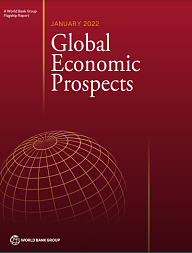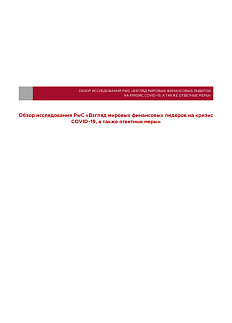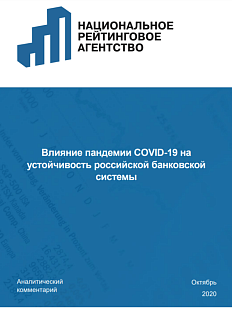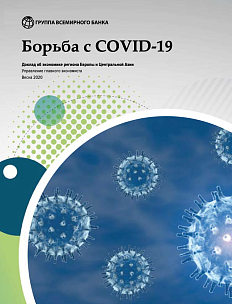The report by the World Bank contains an analysis of economic data, global trends, and regional and global challenges. The analysts assess the current economic context in the wake of the coronavirus pandemic and give a forecast for regional and global economy.
The Roscongress Foundation presents the salient points of the publication accompanied by fragments of broadcasts of relevant panel discussions from the business programme of international events held by the Roscongress Foundation.
Global recovery is hampered by a number of challenges.
After rebounding to an estimated 5.5 percent in 2021, global growth is expected to decelerate markedly to 4.1 percent in 2022. The near-term outlook for global growth is somewhat weaker, and for global inflation notably higher, than previously envisioned, owing to pandemic resurgence, higher food and energy prices, and more pernicious supply disruptions. Global growth is projected to soften further to 3.2 percent in 2023, as pent-up demand wanes and supportive macroeconomic policies continue to be unwound. Although output and investment in advanced economies are projected to return to pre-pandemic trends next year, in emerging market and developing economies (EMDEs) they will remain markedly below, owing to lower vaccination rates, tighter fiscal and monetary policies, and more persistent scarring from the pandemic. Other downside risks, as seen by the World Bank, include Omicron-driven economic disruptions, further supply bottlenecks, a deanchoring of inflation expectations, financial stress, climate-related disasters, and a weakening of long-term growth drivers.
Despite budgetary consolidation, debt levels—which are already at record highs in many EMDEs—are likely to rise further owing to sustained revenue weakness. By 2023, annual output is expected to remain below the pre-pandemic trend in all EMDE regions, in contrast to advanced economies, where the gap is projected to close. The pace of recovery will be uneven across and within regions.
This is why the authors of the report underscore the importance of strengthening global cooperation to foster rapid and equitable vaccine distribution, calibrate health and economic policies, enhance debt sustainability in the poorest countries, and tackle the mounting costs of climate change.
Commodity prices will continue to fluctuate.
Commodity prices soared in 2021 following the broad-based decline in early 2020, with prices of several commodities reaching all-time highs. In part, this reflected the strong rebound of demand from the 2020 global recession. Energy and metal prices generally move in line with global economic activity, and this tendency has strengthened in recent decades. According to the World Bank, global macroeconomic developments and commodity supply factors will likely continue to cause recurring commodity price swings. For many commodities, these may be amplified by the transition away from fossil fuels. To dampen the associated macroeconomic fluctuations, almost two thirds of EMDEs that are commodity exporters need to strengthen their policy frameworks and reduce their reliance on commodity-related revenues by diversifying exports and, more importantly, national asset portfolios.
The pandemic-induced recession caused a surge of global debt and raised income inequality, both within and between countries.
The COVID-19 pandemic has raised global income inequality, partly reversing the decline that was achieved over the previous two decades. Weak recoveries in EMDEs are expected to return between-country inequality to the levels of the early 2010s. Preliminary evidence suggests that the pandemic has also caused within-country income inequality to rise somewhat in EMDEs because of particularly severe job and income losses among lower-income population groups. Over the medium and long term, rising inflation, especially food price inflation, as well as pandemic-related disruptions to education may further raise within-country inequality, particularly in EMDE regions that account for about two-thirds of the global extreme poor.
The authors of the report emphasize that to speed up the return to a green, resilient, and inclusive recovery, a comprehensive package of policies is needed. Assistance from the global community is essential here. Some of the policies named by the analysts include a rapid global rollout of vaccination and redoubled productivity-enhancing reforms. Support targeted at vulnerable populations and measures to broaden access to education, healthcare, digital services and infrastructure, as well as an emphasis on supportive fiscal measures, can help lower within-country inequality.
In the pandemic-induced global recession of 2020, global debt levels surged. The rise in debt has led to several countries initiating debt restructurings, while many others are in or at high risk of debt distress and may also eventually need debt relief. The G20 Common Framework provides a structure to initiate debt restructuring for low-income IDA eligible countries, but largely avoids the issue of outright debt reductions. Future umbrella frameworks for debt restructuring will face greater challenges than those in the past due to a more fragmented creditor base.
Gain more insights about global challenges and possible ways to stabilize the economy during a pandemic in the Economic Inequality, Globalization/regionalization, StayHomeEconomy, and COVID-19 sections of the Roscongress Information and Analytical System.
This is an adaptation of an original work by The World Bank. Views and opinions expressed in the adaptation are the sole responsibility of the author or authors of the adaptation and are not endorsed by The World Bank.






